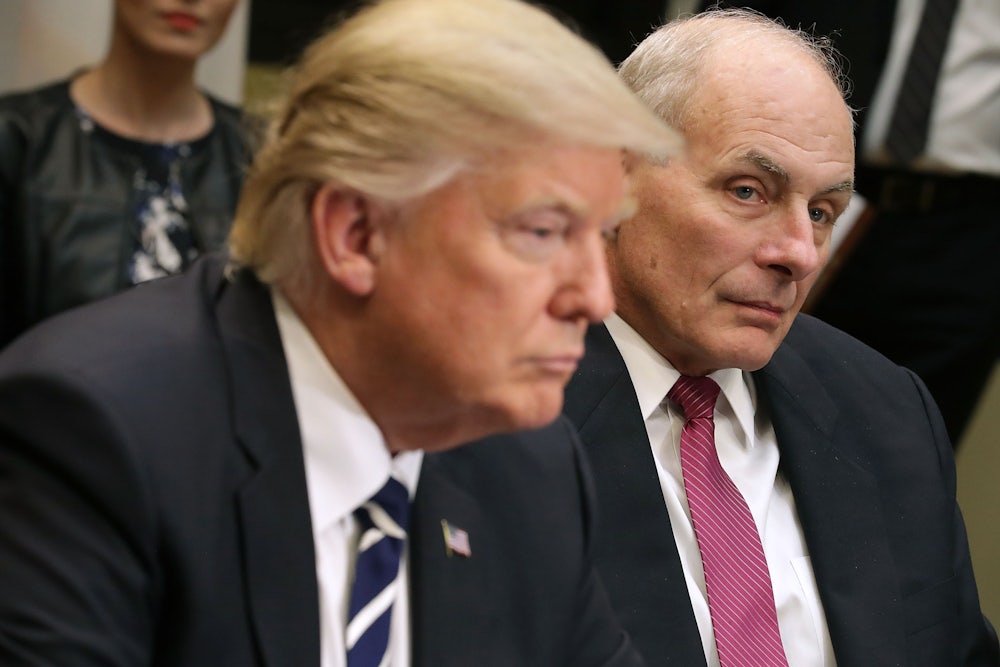The notion that Donald Trump’s presidency constitutes an open-ended, moment-to-moment crisis for the United States and the world is no longer a contested one. If there’s one thing his staunchest allies and opponents agree on, it’s that Trump is dangerous.
They promiscuously leak stories to the press suggesting that they think Trump’s tenure is a national emergency, and that they intend to do very little about it.
It speaks volumes about the precariousness of the situation that the most powerful senior officials in the executive branch, other than the president himself, spend so much of their time justifying their continued service, whispering soothing words to both themselves and to reporters.
Of course, it is not unusual for political aides to have second thoughts about their jobs or the agendas they work to advance, but it is extraordinary that members of this president’s braintrust say they’re sticking around only because they think they can save the president (and through him, all of us) from himself.
What Trump’s inner circle can’t seem to grasp is that the very reason they cite for their continued association with moral obscenity is the same one that ought to be convincing all of them to resign in spectacular fashion.
Almost two weeks ago, Axios founders Mike Allen and Jim VandeHei identified a subset of Trump advisers and legislative leaders who conceive of themselves as an informal “committee to save America.”
On Sunday, Allen published an account of the thinking of six senior administration officials—a set of sources we should assume overlaps with the aforementioned self-styled heroes of the Trump presidency—which can only be read as documentation of a partial consensus within the administration that the president they serve is unfit for the presidency.
The officials fear they are the last things standing between the country and bedlam. In their words, “You have no idea how much crazy stuff we kill.”
“The most common response centers on the urgent importance of having smart, sane people around Trump to fight his worst impulses,” Allen explains. “If they weren’t there, they say, we would have a trade war with China, massive deportations, and a government shutdown to force construction of a Southern wall.”
We’ve always known that Trump is a whirling dervish of rampaging Id, and now it seems that his advisers—assuming their comments are offered in some semblance of good faith—know it too. The irony here is that what the advisers believe is an iron-clad argument for propping up Trump’s presidency is actually an argument for ending it.
Nobody who claims to be protecting the public from even worse outcomes can credibly claim that their influence will last, or that they’ll be in the right places at the right times whenever Trump’s unbridled instincts tell him to do awful things. Their efforts to extend the Trump presidency expose the public to greater risk, not less.
Meanwhile, instead of making thin excuses to the press, these same officials could be repurposing their considerable power and influence to make a lasting change.
The so-called Committee to Save America does not describe a diffuse, unwieldy group of career officials with little influence outside their cubicles. It’s supposedly the eminences of the executive branch, such as the White House chief of staff, the national security adviser, the secretary of defense, and the director of the National Economic Council.
Among themselves, they lack the formal authority to terminate Trump’s presidency, but it doesn’t take much creativity to imagine how they could build it legitimately, either through political channels or channels outlined in the Constitution.
It is possible that nothing under the sun could convince House Speaker Paul Ryan and Senate Majority Leader Mitch McConnell to prepare their members to impeach and remove Trump. But a private entreaty from Trump’s most powerful hand-selected advisers, alerting them to their view that the situation is untenable, would be a stunning action—a warning even spineless GOP leaders couldn’t ignore.
The impact would be enhanced if the foursome warned Ryan and McConnell that absent swift congressional action, they would resign and tell the world of their concerns, and of the leaders’ indifference to it.
Alternatively, the people leaking to Axios and elsewhere could recruit additional cabinet members and Mike Pence to initiate proceedings outlined in Section 4 of the Twenty-Fifth Amendment, under which the vice president and “a majority of . . . the principal officers of the executive departments” can depose the president, at least temporarily.
Neither of these approaches would guarantee Trump’s resignation or removal, but both would place intense pressure on Congress to end its dereliction of duty. Once warned publicly by the leaders of Trump’s national security and economic policy apparatus that Trump’s continued service is endangering the country, Republicans in Congress would find themselves, and every vote they took apart from the ones required in the impeachment process, under withering scrutiny. With the country at stake, and its fate in their hands, a pivot to tax cuts would be career suicide.
This is the moment to save the entire nation from Trump, and it isn’t liberals who are saying it—it’s Trump’s own lieutenants. Given the level of competency we’ve come to expect from people who work for him, it will be no surprise to see them fail.
